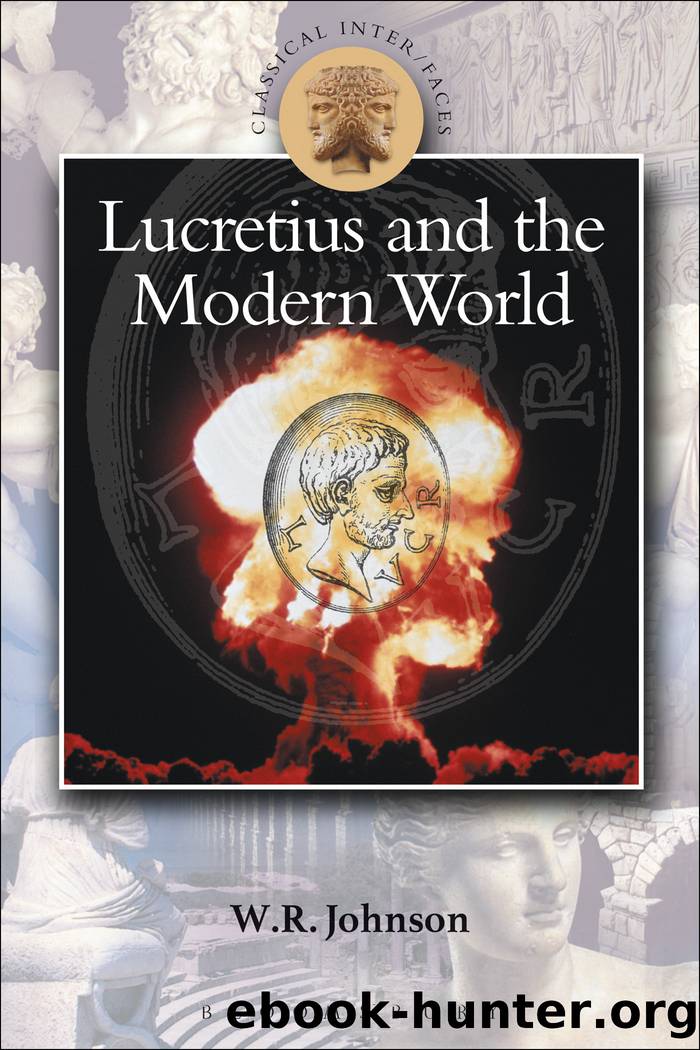Lucretius and the Modern World by Johnson W. R

Author:Johnson, W. R.
Language: eng
Format: epub
Publisher: Bloomsbury UK
Published: 2015-07-14T16:00:00+00:00
Meanwhile, across the Channel
Throughout the eighteenth century, in the nations of Europe, the men (and women) of the Enlightenment would carry about with them pocket editions of Lucretius, a Lucretius defined in large measure by the spirit that enforms the Gassendi-Dryden selections, a sanitised and invisibly abridged Lucretius (all the text was there but you knew which pages to memorise and which to close your eyes to), a Lucretius inside whose poem various tribes of modern humanism might flirt with modern Christian sensibilities. But in France, which had produced three translations of Lucretius before Creech’s (Spink 103-9, 148-51), more people read more of the poem as the Enlightenment picked up steam. Though natural scientists, as they progressed in their studies, might begin to find Lucretius an embarrassing ancestor (forgetful of the role he had recently played in the shaping of their disciplines), though the more fervent hedonists might come to dismiss him as something of a prude (Fleischmann 1963, 634), his hatred of superstition and his determination to find or to invent meaning in a godless universe permeate the spirit if not the letter of the philosophes’ efforts to rethink our place in reality.
A clear index of that wide and abiding influence is available in Cardinal Melchior de Polignac’s Anti-Lucretius: Or, On God and Nature (1671-1742); the poem was published after his death in 1747 and a translation of it in English, by George Canning, appeared in 1767 (Hadzsits 321; the poem was published posthumously in Paris in 1747, Ament 29). The villains of the Cardinal’s poem are various miscreants who purvey various styles of materialism (Hobbes, Gassendi, Newton, Locke); but, as the title of the poem signals, the corrupt minds behind them, seeding their heresies and nourishing them, are the Greek atomist and his Roman interpreter, whose poem and whose style the Cardinal knows well enough to imitate (with marked success) in Latin hexameters. Here is his opening salvo against Epicurus (Canning, 7):
The Man, who first dard hardily to feign,
Gods scarce existing, lazy, dull and vain,
Who framd eternal Atoms at his will,
By casual concourse empty space to fill,
Who doomd to death man’s noblest part, the soul,
And gave blind chance the conduct of the whole,
With shameless confidence, himself proclaims
(Herald of pleasure) all his guilty aims.
Polignac sidesteps the easy mistake of confusing Lucretius and the master who corrupted him with atheists. Worse than atheism, their blasphemy allows for the semi-existence of deities who are ‘lazy, dull and vain’ (so p. 167, ‘A lazy, dull, inert, inglorious breed,/ Your idle gods from casual atoms sprung’). They mock true Godhead, which has in any case been usurped by the audacious founder of the sect who reinvents (‘at his will’) the universe, imagining it to consist of eternal atoms and the void they move in (and fill up). This perverter of truth denies the immortality of the soul and insists that it is chance, not Providence, that guides the universe. He also professes the gospel of (sensual) pleasure, and he glories in his crimes.
Download
This site does not store any files on its server. We only index and link to content provided by other sites. Please contact the content providers to delete copyright contents if any and email us, we'll remove relevant links or contents immediately.
| Anthropology | Archaeology |
| Philosophy | Politics & Government |
| Social Sciences | Sociology |
| Women's Studies |
The remains of the day by Kazuo Ishiguro(8968)
Tools of Titans by Timothy Ferriss(8363)
Giovanni's Room by James Baldwin(7319)
The Black Swan by Nassim Nicholas Taleb(7103)
Inner Engineering: A Yogi's Guide to Joy by Sadhguru(6785)
The Way of Zen by Alan W. Watts(6594)
Asking the Right Questions: A Guide to Critical Thinking by M. Neil Browne & Stuart M. Keeley(5752)
The Power of Now: A Guide to Spiritual Enlightenment by Eckhart Tolle(5744)
The Six Wives Of Henry VIII (WOMEN IN HISTORY) by Fraser Antonia(5495)
Astrophysics for People in a Hurry by Neil DeGrasse Tyson(5174)
Housekeeping by Marilynne Robinson(4434)
12 Rules for Life by Jordan B. Peterson(4299)
Double Down (Diary of a Wimpy Kid Book 11) by Jeff Kinney(4257)
The Ethical Slut by Janet W. Hardy(4241)
Ikigai by Héctor García & Francesc Miralles(4237)
Skin in the Game by Nassim Nicholas Taleb(4235)
The Art of Happiness by The Dalai Lama(4120)
Skin in the Game: Hidden Asymmetries in Daily Life by Nassim Nicholas Taleb(3987)
Walking by Henry David Thoreau(3950)
